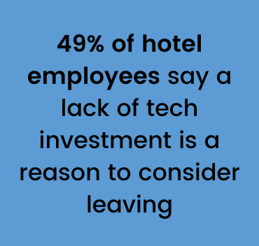The news continues to be full of The Great Resignation, and we all feel it. As recently as last week, the New York Times reported that staffing levels for hospitality businesses continue to be 10% below pre-pandemic levels and people in our industry are among the most likely to quit. Finding and hiring people is tough. But keeping them is tough too, and that’s a smart thing to focus on. Making sure you can count on those people to be part of a high-functioning team is even smarter.
If you’re not convinced that you need to put real effort into retaining your people, calculate your ROI of improving staff retention (If you haven’t downloaded our ebook to learn more about Human Capital ROI, Training Investment Value, and Turnover rate, you can do that here.) Simply put, it costs you a lot to hire and train someone new. And every new hire creates new risk, as you put inexperienced staff in contact with your guests. Obviously, we think you should invest in a solution like WrkSpot. And technology is absolutely a plus. Not only can you save time, increase productivity, and enable your staff to connect and collaborate, but a 2021 survey found that 49% of hotel employees said that a lack of tech investment was a reason they would consider leaving.
WrkSpot. And technology is absolutely a plus. Not only can you save time, increase productivity, and enable your staff to connect and collaborate, but a 2021 survey found that 49% of hotel employees said that a lack of tech investment was a reason they would consider leaving.
Technology is not the only answer, of course. With or without that investment, there are a lot of things good managers should be doing right now, and always.
Start by understanding some of the triggers that push people out the door. We hear a lot about people leaving for self-fulfillment, remote work (tough to do in a hotel!) and higher pay. Regardless of the reason, a departure can be encouraged by:
- A work anniversary. People are more likely to contemplate a change when they are reminded of how long they have been in their current position. So celebrate their milestone (which can help with retention) but remember that, whether you highlight it or not, people are more aware of the passage of time around their anniversary date. This is especially true for big milestones, like 5 or 10 years.

- A personal milestone. A significant birthday, getting married, having a baby, losing a parent, and other critical events, make us think about who we are and how we’re spending our time. That includes whether we’re doing the work we want or need to be doing.
- A change in management or structure of our work, including a coworker’s departure. Any change that’s beyond our control can rattle us. Something that affects your day-to-day life will have an even bigger impact. If we’re asking people to learn how to communicate with a new manager, to change their routine, or to change shifts, that creates an opportunity to question whether or not your staff is where they want to be.
- Not getting a promotion, raise, or change of role that they asked for. Or just not getting a promotion or raise in a long time. After a while, people will start to believe that the grass is greener elsewhere. And if they aren’t getting recognition for their work, they may be right.
So what do you do if you sense that someone on your staff is joining the up to 70% of Americans who feel disengaged from their work? How do you keep them from walking out the door?
- For starters, make it easy to come to work, to clock in and clock out, to safely store coats and personal belongings. Make sure expectations are communicated, schedules and holiday details are posted early, and you have a clear policy for trading shifts, requesting time off, logging overtime, etc. People are less likely to leave an environment that is easy to work in.
That ease is dependent on great communication. This may feel like overcommunication to you, but we need to hear something seven times to really absorb it. And that’s for people who are already engaged and receptive. If I’m not interested or I don’t see how what you’re saying relates to me or my job, I’ll need to hear it even more. So if something is changing, or you need your staff to do something that’s not part of the regular routine, tell them about it many times, in different ways. And make sure the communication goes both directions. How does it feel when you’re told to do something, over and over, and you have no voice? Depending on the person, the job, and the situation, that is often appropriate. But letting people voice concerns, help with problem-solving, and feel able to contribute to next steps makes a big difference in how valued we all feel. And that helps your staff feel more engaged. (For more on managing change, see our Jan 18 WrkSpot blog post.)
- Remember that not everyone is motivated by the same thing. You have some employees who are only there for the paycheck. That’s more likely in certain roles, but it’s not uncommon to find a front desk person or even a General Manager who is easily enticed to walk out the door while some of your housekeeping or maintenance staff feel more tied to your organization. Regardless of the role, think about who is there for the regular pay and who stays for more than that. You can think about retention slightly differently for those two groups.
How do you tell the difference? Listen. Really listen. That may seem like a time consuming exercise in frustration, but you will find that it is time well spent. Actively listening to your staff, whether it’s one-to-one or in groups, will tell you pretty quickly whose primary concern is the paycheck and who is looking for opportunity and a career, in addition to the money.
- Look for ways to reward people who are primarily there for the money. Do you have regular pay increases they can look forward to? Are the guidelines for those clear? If you don’t have regular increases, can you bump up pay for people who have been on the team longer? Or find a creative way to give a bonus, say to recognize a special work anniversary or achievement? Maybe you can give spot bonuses to your most productive team members. (WrkSpot tracks meaningful performance metrics, giving you insight into productivity and enabling a pay for performance model!) What about providing commute benefits like a bus pass that helps financially and also makes it easier for people to get to work?
That recognition doesn’t have to just be financial. Even when it’s about the money, it’s not entirely about the money. Providing a meal on a regular basis can feel like a gift; it means staff members don’t have to pack their own that day, or pay for takeout. Highlighting special achievements for the week or month can also help build loyalty. You don’t need an ‘employee of the month’, just a shout-out to someone who’s gone above and beyond. If you’re the owner, consider sending that message yourself. Recognition from someone more senior than the person’s manager can send a powerful message.
And keep listening. Some people who are initially there ‘just’ for the money turn into people who want a career. Remember Maslow’s hierarchy of needs? I’m vastly oversimplifying, but when someone isn’t worried about food, rent and gas, you may find they’re thinking about career opportunities instead.
- Don’t forget the people who are there because they specifically want to be in that role and/or at your hotel. Spend a little time with people who are eager to learn and grow. Just five minutes over coffee or walking and talking can make a difference. Learn how they think, what their skills are, and what they’re interested in. Then look for opportunities that align with their interests and with your needs. You may rethink how you handle emergency coverage, for example. I know I have a strong tendency to jump in myself if someone is out sick or on vacation. My thoughts go something like, “I’ll just cover it myself. It’s faster. And then I’ll know it’s done.” Long-term, that’s not my best strategy. Instead, identify someone who can cover the front desk and start to train them; let them cover the front desk while the person on shift goes to get a cup of coffee. Take baby steps. When your front desk person suddenly calls in sick, or even quits, you now have someone partially trained and ready to step in. The same holds true for every part of your staff. Someone on housekeeping staff would make a great leader, and they may not even know it themselves. Identify those people, coach them, and make sure they’re ready.
Mentoring, whether formal or informal, is another easy way to give people a sense of possibility and engagement. Match your high-potential employees with someone one level up, or in the role they aspire to. Then ask them to spend some time together. Ask the more senior person to tell the more junior staff member about their job, what skills they need, how they got into the role…. Even fifteen minutes a week can make a huge difference in helping someone see, and realize, their potential in your hotel. And that helps them feel more engaged, and more likely to stick around.
It may be hard to think about adding employee retention to your already long list. But the results can be powerful and will save you pain in the long run. In today’s hiring environment, you can’t afford not to think about it.

 WrkSpot. And technology is absolutely a plus. Not only can you save time, increase productivity, and enable your staff to connect and collaborate, but a 2021 survey found that 49% of hotel employees said that a lack of tech investment was a reason they would consider leaving.
WrkSpot. And technology is absolutely a plus. Not only can you save time, increase productivity, and enable your staff to connect and collaborate, but a 2021 survey found that 49% of hotel employees said that a lack of tech investment was a reason they would consider leaving. 

